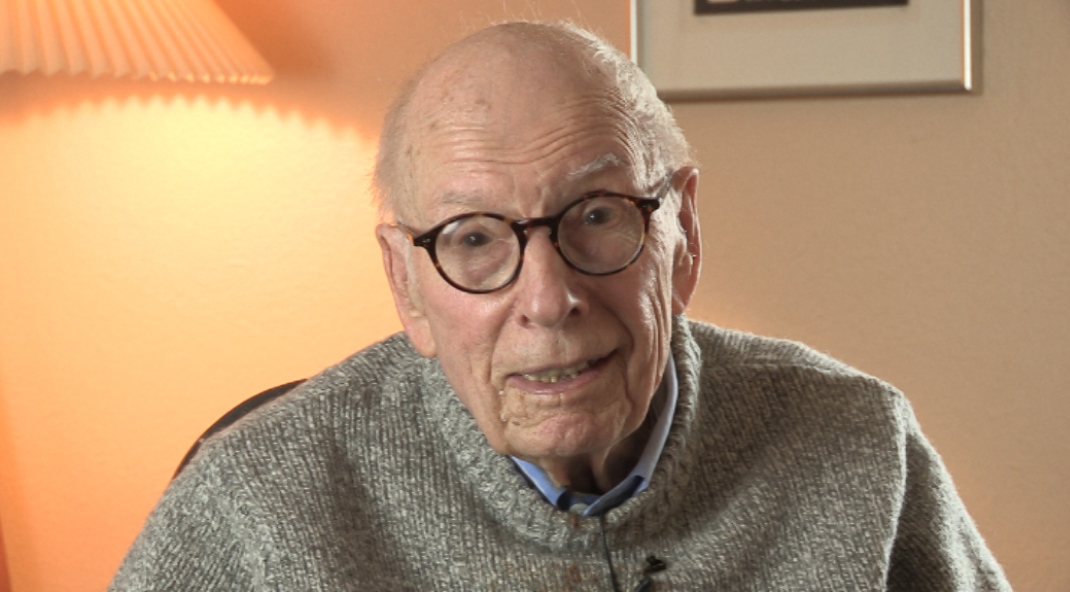NEXT STORY

Notable scientist friends
RELATED STORIES

NEXT STORY

Notable scientist friends
RELATED STORIES


|
Views | Duration | |
|---|---|---|---|
| 41. Like rewriting Hamlet! | 30 | 04:49 | |
| 42. Physics of shapes appeals to everyone | 35 | 00:38 | |
| 43. An unusual birthday present | 31 | 01:59 | |
| 44. Roy Chapman Andrews - the real Indiana Jones | 60 | 02:38 | |
| 45. Collecting mosquitoes puts me off applied biology for life | 37 | 01:29 | |
| 46. A very different part of America | 40 | 01:04 | |
| 47. My very happy marriage | 91 | 01:54 | |
| 48. Alzheimer's disease | 83 | 01:03 | |
| 49. A Eureka moment in the lab | 40 | 01:43 | |
| 50. Learning molecular biology from the roots | 42 | 02:47 |


[Q] Tell me about the time when you went to work in Paris and why, and sort of…
Well, I was quite early in my slime mold years, which there have been a great many, I decided that if I just worked on slime molds all my life, I'd have a distorted view of biology, and that I ought to spread out. And so I greatly admired the work of Fauré-Fremiet. And Fauré-Fremiet was a perfectly remarkable man. He was the son of the composer Fauré and the grandson of Frémiet, who is a sculptor who did the Jeanne d'Arc in the Place des Pyramides. And then, he was the nephew, I guess it was, of Sully Prudhomme, a philosopher. So there was a lot of genes wrapped up. And he was a wonderful person, just wonderful. And he sort of took me in hand, and taught me really how to do research on ciliate protozoa. And it was a terrific time for me.
I also got involved during the birth of molecular biology because there was a group that met once every two weeks, or something like that, in the late afternoon and then, would have dinner. The meetings were always some place that you could eat well. And it had François Jacob, it had Jacques Monod and a number of other people who were really right there at the beginning of molecular biology, and who were very sharp, very sharp. And I used to enjoy that tremendously. Boris Ephrussi was another one. And so I went to those and sort of have this feeling that I learned molecular biology from the roots. Why didn't I stick with it? I was very glad that other people were doing it.
John Tyler Bonner (born in 1920) is an emeritus professor in the Department of Ecology and Evolutionary Biology at Princeton University. He is a pioneer in the use of cellular slime molds to understand evolution and development and is one of the world's leading experts on cellular slime molds. He says that his prime interests are in evolution and development and that he uses the cellular slime molds as a tool to seek an understanding of those twin disciplines. He has written several books on developmental biology and evolution, many scientific papers, and has produced a number of works in biology. He has led the way in making Dictyostelium discoideum a model organism central to examining some of the major questions in experimental biology.
Title: Learning molecular biology from the roots
Listeners: Christopher Sykes
Christopher Sykes is an independent documentary producer who has made a number of films about science and scientists for BBC TV, Channel Four, and PBS.
Tags: Paris, Emmanuel Fauré-Fremiet, Gabriel Fauré, Emmanuel Frémiet, François Jacob, Jacques Monod, Boris Ephrussi
Duration: 2 minutes, 47 seconds
Date story recorded: February 2016
Date story went live: 14 September 2016